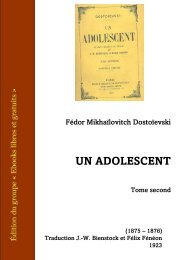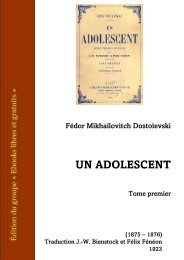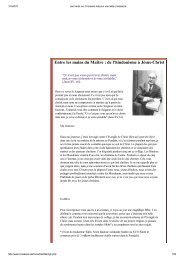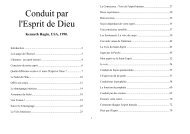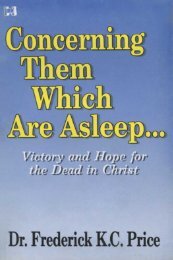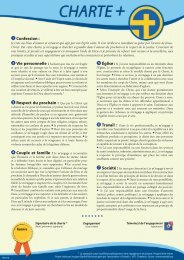341332
You also want an ePaper? Increase the reach of your titles
YUMPU automatically turns print PDFs into web optimized ePapers that Google loves.
12 FATHERS, PASTORS AND KINGS<br />
Chapters 3 and 4 examine the contrasting views of episcopacy proposed<br />
by the episcopate, the lower clergy and the papacy by placing their many conflicts<br />
in the context of Tridentine ecclesiological politics. Faced with severe<br />
resistance to their discipline from the lower clergy, seventeenth-century French<br />
bishops were obliged to define and defend their rights of jurisdiction so that<br />
their monarchical authority could reign supreme in their dioceses. While the<br />
reformers’ views of hierarchy and episcopal dignity were helpful to the bishops<br />
in developing their justification of episcopal status vis-à-vis the lower clergy, the<br />
very fact that the regulars and curés offered such sophisticated and vigorous<br />
arguments for their independence from their bishops forced the episcopate<br />
towards definite and categorical statements of its own convictions. Furthermore,<br />
when the regulars claimed that their papal privileges exempted them<br />
from episcopal supervision, this had enormous consequences for the bishops’<br />
relationship with the papacy. Chapter 4 explores how collusion between Rome<br />
and the regulars pushed the bishops towards a fiercely protective doctrine of<br />
episcopal gallicanism that was finally cemented in the 1682 Gallican Articles.<br />
Equally, however, the episcopate resented what it believed were Rome’s efforts<br />
to undermine the traditional rights that protected its honour and authority.<br />
Ultimately, the crises over papal privileges and the trial and judgement of bishops<br />
were stark manifestations of a crucial jostle for power between two key<br />
hierarchical offices of the Tridentine church: a papacy that is often, and too<br />
readily, considered to have immeasurably enhanced its power during the early<br />
modern era and an episcopate that was determined to offset that tendency. 35 In<br />
all, the bishops fought with notable success to prevent a centralising Rome from<br />
converting their office into a docile agency of papal autocracy.<br />
In their quarrels with the papacy, the bishops found, in the Assembly of<br />
Clergy, a priceless mouthpiece for their coherent views on the structure of the<br />
ecclesiastical hierarchy and their role in the government of the church. As<br />
the principal forum for contemporary French ecclesiastical affairs 36 and as a<br />
body dominated by the episcopate who supplied the majority of its deputies,<br />
the Assembly proved just as instrumental in defending the episcopal power to<br />
judge matters of faith. During the 1650s, however, it clashed heavily with<br />
Jansenist bishops as a result of their different interpretations of this principle,<br />
demonstrating that the Assembly’s bishops did not invariably sing from the<br />
same song-sheet as those prelates whom they claimed to represent: the majority<br />
of bishops rejected papal infallibility and favoured conciliarism, but many<br />
certainly did not agree that the Assembly should act as a national council with<br />
absolute power over every French bishop.<br />
It was not, of course, simply to the dilemmas thrown up by Trent and<br />
reform that the episcopate had to respond. Chapter 5 addresses the episcopate’s<br />
understanding of its status and its role towards another power that consistently







